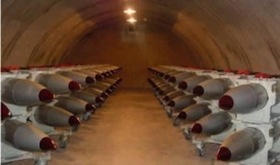Experts: NATO Should Shed Tactical Nuclear Weapons
July 18, 2011
Featured Image
Today's top nuclear policy stories, with excerpts in bullet form.
Stories we're following today: Monday, July 18, 2011.
Experts Urge NATO to Reduce Role of Nuclear Weapons and Open the Door for the Removal of U.S. Tactical Warheads - Arms Control Association [link]
- In a letter delivered July 12 to NATO member states and Secretary General Anders Fogh Rasmussen...More than two dozen nuclear experts and former senior government officials are calling on NATO "to declare a more limited role for its nuclear capabilities that would help open the way for overdue changes to its Cold War-era policy of forward-basing U.S. tactical nuclear weapons. This would help facilitate another, post-New START round of reductions, which should involve of all types of Russian and U.S. nuclear weapons."
- ”U.S. non-strategic nuclear forces deployed in Europe and assigned to NATO do not serve a deterrence or retaliatory function that cannot be provided by the strategic nuclear forces or conventional military assets of Alliance members."
- Paul Ingram of the British American Security Information Council and a signatory said: "NATO's failure to remove these outdated free-fall bombs that have no military or deterrence value and little public support, risks harming future Alliance unity and relevance."
House Approves $1 Billion Cut to Nuclear Agency Funding - Martin Matishak in Global Security Newswire [link]
- The U.S. House of Representatives on Friday approved … the fiscal 2012 Energy and Water Appropriations bill [which] would provide the [National Nuclear Security Administration], a semiautonomous branch of the Energy Department, $10.6 billion … [This] is roughly $1.1 billion less than President Obama's original $11.7 billion request for the agency for the budget year that begins on October 1.
- ... on Wednesday lawmakers adopted by voice vote an amendment offered by Representative Jeff Fortenberry (R-Neb.) and House Armed Services Strategic Forces Subcommittee top Democrat Loretta Sanchez (Calif.) to ostensibly restore $35 million to the agency's Global Threat Reduction Initiative.
- Both House measures ultimately have to be wed with the Senate defense authorization and Energy and Water appropriations bills before going to President Obama for his signature or veto. The Senate is not expected to take up its version of the spending measure until after the August recess.
Upcoming Events
- July 19, 2:00-3:30pm: Hans Kristensen, Federation of American Scientists; Steven Pifer, Brookings Institution; and Franklin Miller, Scowcroft Group, "NATO's Nuclear Future: The Alliance's Posture Review, Non-Strategic Nuclear Weapons in Europe, and Arms Control." Held at the Brookings Institution, Saul/Zilkha Rooms, 1775 Massachusetts Ave., NW, Washington. RSVP online.
- July 21, 11:00am-12:00pm: Pervez Musharraf, former president of Pakistan, "The State of the U.S.-Pakistan Relationship." Held at the Wilson Center, Reagan Building, 1300 Pennsylvania Ave., NW, Washington. NOTE: RSVPs are required for media organizations only. Non-media attendees need not RSVP. RSVP online.
- See and subscribe to the full Nuclear Calendar here.
As Obama Prepares to Push Nuclear Test Ban, Technological Basis Still Debated - Chris Schneidmiller in Global Security Newswire [link]
- It has been 12 years since the U.S. Senate last considered the Comprehensive Test Ban Treaty, which supporters say has been enough time for technology to catch up with the concerns that previously derailed the pact.
- Treaty proponents argue that the United States should now feel assured it can keep its nuclear arsenal in working order without actually setting off weapons, and can be confident that no other nation could carry out a secret test blast.
- Critics have a different take, saying developments since 1999 have only made more obvious the dangers of accepting a binding prohibition on nuclear blast trials.
- All of these issues -- and more -- could be raised when the treaty goes back to the Senate. How much sway the technological developments of the last decade will have in determining the accord's chances for approval will be determined only then.
The Nuke Lamp Wants to Blow Up Your Desk - Gizmodo [link]
- Designed by Veneridesign Studio, this lamp tries to capture the awful beauty of a nuclear strike. The fluid details created using 3D-printing techniques, its like staring into a frozen mushroom cloud.


